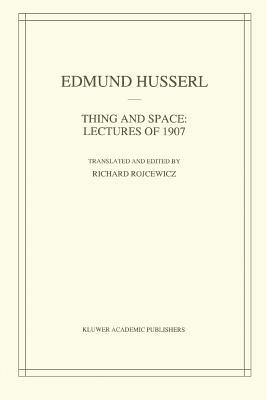
- We will send in 10–14 business days.
- Author: Edmund Husserl
- Publisher: Springer
- ISBN-10: 9048149134
- ISBN-13: 9789048149131
- Format: 15.6 x 23.4 x 2 cm, minkšti viršeliai
- Language: English
- SAVE -10% with code: EXTRA
Reviews
Description
This is a translation of Edmund HusserI's lecture course from the Summer semester 1907 at the University of Gottingen. The German original was pub- lished posthumously in 1973 as Volume XVI of Husserliana, Husserl's opera omnia. The translation is complete, including both the main text and the supplementary texts (as Husserliana volumes are usually organized), except for the critical apparatus which provides variant readings. The announced title of the lecture course was "Main parts of the phenome- nology and critique of reason." The course began with five, relatively inde- pendent, introductory lectures. These were published on their own in 1947, bearing the title The idea ojphenomenology.l The "Five Lectures" comprise a general orientation by proposing the method to be employed in the subsequent working out of the actual problems (viz., the method of "phenomenological reduction") and by clarifying, at least provisionally, some technical terms that will be used in the labor the subsequent lectures will carry out. The present volume, then, presents that labor, i.e., the method in action and the results attained. As such, this text dispels the abstract impression which could not help but cling to the first five lectures taken in isolation. Accord- ingly, we are here given genuine "introductory lectures," i.e., an introduction to phenomenology in the genuine phenomenological sense of engaging in the work of phenomenology, going to the "matters at issue themselves," rather than remaining aloof from them in abstract considerations of standpoint and approach.
EXTRA 10 % discount with code: EXTRA
The promotion ends in 22d.10:43:30
The discount code is valid when purchasing from 10 €. Discounts do not stack.
- Author: Edmund Husserl
- Publisher: Springer
- ISBN-10: 9048149134
- ISBN-13: 9789048149131
- Format: 15.6 x 23.4 x 2 cm, minkšti viršeliai
- Language: English English
This is a translation of Edmund HusserI's lecture course from the Summer semester 1907 at the University of Gottingen. The German original was pub- lished posthumously in 1973 as Volume XVI of Husserliana, Husserl's opera omnia. The translation is complete, including both the main text and the supplementary texts (as Husserliana volumes are usually organized), except for the critical apparatus which provides variant readings. The announced title of the lecture course was "Main parts of the phenome- nology and critique of reason." The course began with five, relatively inde- pendent, introductory lectures. These were published on their own in 1947, bearing the title The idea ojphenomenology.l The "Five Lectures" comprise a general orientation by proposing the method to be employed in the subsequent working out of the actual problems (viz., the method of "phenomenological reduction") and by clarifying, at least provisionally, some technical terms that will be used in the labor the subsequent lectures will carry out. The present volume, then, presents that labor, i.e., the method in action and the results attained. As such, this text dispels the abstract impression which could not help but cling to the first five lectures taken in isolation. Accord- ingly, we are here given genuine "introductory lectures," i.e., an introduction to phenomenology in the genuine phenomenological sense of engaging in the work of phenomenology, going to the "matters at issue themselves," rather than remaining aloof from them in abstract considerations of standpoint and approach.


Reviews